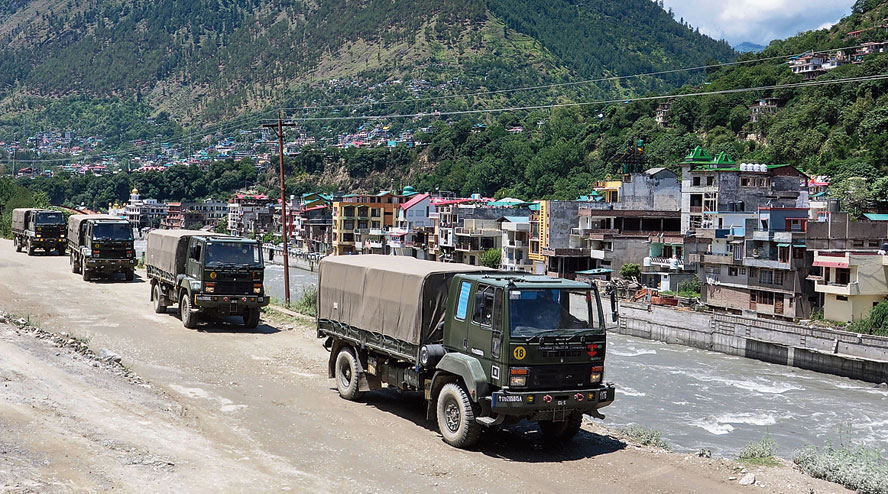Sunday was the 18th round of military talks between the Indian Army and the Chinese People’s Liberation Army (PLA) to ease tensions along the disputed Line of Actual Control (LAC), where the two countries have been in a border dispute for almost three years.
The last time the two sides talked at the Corps Commander level was in December 2022. They talked about problems along the line that still needed to be solved.
In early May, the border dispute between India and China will have been going on for four years. Even though there have been four rounds of withdrawal from Galwan Valley, Pangong Tso, Gogra (PP-17A), and Hot Springs (PP-15), the Indian and Chinese armies still have more than 60,000 troops and modern weapons in the Ladakh theater.
So far, the Indian and Chinese forces have had 18 rounds of talks, but problems at Depsang in Daulet Beg Oldi sector and Charding Nullah Junction (CNJ) in Demchok sector are still being talked about. Unresolved problems were talked about, but no one knew what would happen.
Officials with knowledge of the situation said on Sunday that the talks are happening before the Chinese defense minister’s planned trip to India for a Shanghai Cooperation Organisation (SCO) meeting on April 27 and 28 in New Delhi. Before this report was made, there was no official statement about the LAC talks.
On April 27, the Chinese defense minister Li Shangfu and the Russian defense minister Sergei Shoigu will meet with their Indian colleague Rajnath Singh. The main meeting of SCO defense ministers will take place the next day. In May, the SCO foreign ministers will meet in India.
These meetings will lead up to the SCO Summit, which will be place in July. India will host the summit for the first time since it joined the group in 2017. SCO includes eight member states — India, China, Kazakhstan, Kyrgyzstan, Pakistan, Russia, Tajikistan and Uzbekistan.
At their last meeting in December 2022, the two sides agreed to keep “security and stability on the ground in the Western Sector” of the LAC. A statement said, “The two sides agreed to stay in close contact, keep talking through military and diplomatic channels, and find a solution to the remaining problems that is acceptable to both sides as soon as possible.” This meeting happened just 11 days after a fight along the LAC at Yangtse, near Tawang in Arunachal Pradesh, left several Indian and Chinese troops hurt.
Li is going to New Delhi for a meeting of SCO defense ministers. This is the first time a Chinese defense minister has been there since the Galwan clash in June 2020, which hurt relations between the two countries. Twenty Indian troops were killed in the seven-hour battle near Patrolling Point 14 in Galwan Valley. India says that the PLA lost twice as many troops as the Indian Army, even though Beijing says that only four Chinese soldiers were killed.
On April 19, Singh said he was confident that the Indian Army could handle any situation along the country’s border with China. He also said that talks would continue to find a peaceful solution to the ongoing dispute in the Ladakh sector and that withdrawal and de-escalation were the best ways to move forward.
In March, India said it would set up a top panel to speed up infrastructure projects in places near the border with China, where talks are going on to end the standstill.
At a high-level meeting led by Singh to check on the progress of a range of infrastructure projects along the China border, it was decided to set up a committee of secretaries to speed up the projects. Several ministries are working together on the projects in the forward areas. These include the ministries of defense, road transport and roads, environment, forests, and climate change, railways and communications, and power and new and renewable energy.
The secretaries of these departments are on the new committee. The committee will meet often to check on how different projects are going.
The army is building infrastructure quickly in Ladakh and Arunachal Pradesh to give soldiers a better place to live and better facilities, to protect the modern weapons and equipment they have there, and to make it easier for people and things to move quickly in case of an emergency during the ongoing standoff with the PLA.
After the standoff began in May 2020, India sent thousands of extra troops and modern military equipment to the Ladakh sector to counter the Chinese military buildup. The new situation along the LAC also required a push for infrastructure to help the army’s deployments work better.
The army has taken steps to support its forward deployments along the LAC. These include building modular shelters for troops stationed at heights of up to 18,000 feet, housing for reserve troops in the back, storage facilities for tanks, artillery guns, and other equipment, underground storage facilities for ammunition, airfields, and new roads, bridges, and tunnels in rough terrain to make it easier to get around.
